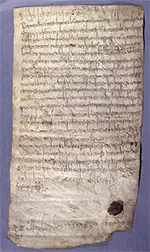Salic Law
Salic Law was a legal code derived from the traditions of the Salians, a tribe of Franks who settled in what is now France in the waning days of the Roman Empire. 
The law, written down in Latin near the end of the reign of the Frankish king Clovis and later translated into Old High German, set down statutes, in the form of Titles 1–62, governing practices and punishments (mainly fines) for various offenses, including theft, assault, arson, robbery, murder, and even uttering insults. The Salic Law also mentioned wergeld, the paying of money in return for the death of a warrior, and set out policy for migration. Most significantly, as it came to be as the Merovingians gave way to later rulers of France, the Salic Law also had statutes regarding the inheritance of property. It was entirely common practice for sons to inherit from fathers. Title 59, concerning private property, set down a series of conditions for inheritance. A man who had no sons could leave his private property to his parents, or his brothers, or his sisters. In this respect, women could inherit from men, as long as they weren't the man's wife. In addition, Title 59 had six points to it and Point 6 said this: "Of Salic land no portion of the inheritance shall come to a woman." So the private property that a man's sister could otherwise inherit did not include whatever land that man might own. Through the years, authorities interpreted this to include the kingship, so that a king who had a daughter but not a son could not leave the kingdom to his daughter and, therefore, have her be queen after him. |
|
Social Studies for Kids
copyright 2002–2024
David White




